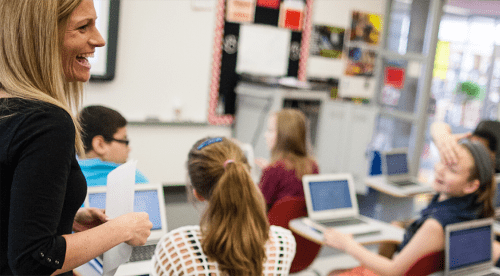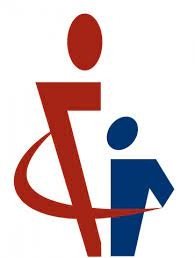McDowell Institute

- Contact Information
-
- 570-389-5222
- Send an Email
-
214 Navy Hall
- Social Media
Fostering Wellness Through Education
Our McDowell Institute supports the facilitation of social, emotional, and behavioral wellness of children, youth, and young adults across school and community settings. This mission is accomplished through training, technical assistance, and information dissemination.
The Institute’s initial focus was to incorporate instruction in Positive Behavior Support into Bloomsburg’s educator preparation curriculum. This has been accomplished by situating an array of value-added learning experiences for all education majors starting at the onset of their enrollment (e.g., freshman year) up through program completion (e.g., graduation following completion of student teaching). Since its inception in 2012, more than 1,000 undergraduate and graduate pre-service educators plus Bloomsburg faculty and staff have participated in numerous and distinct professional development events on campus associated with facilitating social, emotional, and behavioral wellness in PK-12 students.
In recent years, the McDowell Institute has further expanded its outreach and impact with PK-12 students through partnership initiatives beyond campus. The Institute continues to be highly visible as a resource to local schools through regional partnerships (e.g., Greater Susquehanna Valley United Way) and at the state level through collaboration with state-level partners including the Pennsylvania Training and Technical Assistance Network (PaTTAN), Office for Safe Schools and the Office of Mental Health and Substance Abuse Services (OMHSAS).
The McDowell Institute is currently operating more than 40 interrelated initiatives in play to facilitate social, emotional, and behavioral wellness of children, youth, and young adults across school and community settings.
Higher Ed Initiatives
- Gatekeeper Training - see section below
- Trauma-Informed Practices
McDowell Fellowships
PK-12 Initiatives
- Gatekeeper Training - see section below
- School Integration - see section below
- Pennsylvania Youth Survey
- PDE Report
- Additional Details: Trauma-informed Survey of PA Educators
- Baker's Dozen
- Alignment of PA Career Ready Skills &Trauma Informed Care Principles
Pocket Guides
Virtual Instruction
Students will be able to take any of the micro-credentials at anytime throughout the year at their own pace. For more information or to access a micro-credential contact Danielle Empson (dempson@bloomu.edu).
Micro-Credentialing Open Registration
What is a Micro-credential?
A micro-credential is a short, competency-based recognition that allows an aspiring educator or related human service provider to demonstrate mastery in a particular area. McDowell Institute micro-credentials are grounded in research and best practice and designed to be:
- Personalized: You can create your own learning journey, based on your interests and career goals
- Flexible: You can study, learn and grow when it’s convenient for you
- Performance-based: McDowell Institute micro-credentials are awarded based on demonstrated competency
What is required to become Micro-Credentialed?
Pre-requisite Core Components - Asynchronous Virtual Module Orientation Series on Trauma and Adverse Childhood Experiences (ACEs)-Projected time commitment: two hours
Micro-credential Specialized Areas of Interest — After completion of the pre-requisite core components students identify their specialized area(s) of interest. The projected time commitment to complete any selected micro-credential area ranges between 8 – 10 hours.
- McDowell Institute: Youth Suicide Prevention
- McDowell Institute: Bully Prevention in Pre-Kindergarten Programs
- McDowell Institute: Bully Prevention in K – 4 Programs
- McDowell Institute: Bully Prevention in the Middle School
- McDowell Institute: Bully Prevention in the High School
- McDowell Institute: Comprehensive Bully Prevention PK-12
- ***McDowell Institute: Equity and Inclusion in Schools*** Coming soon
Students receive their respective digital micro-credential upon completion of their selected special area(s) of interest. Completion of three or more or the completion of two of the previously noted areas of interest plus two additional pre-approved professional development experiences will result in award of each completed digital micro-credential plus an Advanced McDowell Institute Certificate of completion coupled with a graduation stole to be awarded for commencement.
- Professional Development Experiences (Pre-approval required)
- Conference Attendance (germane to the social-emotional-behavioral wellness of youth)
- Internship/Field Experience (10 hours beyond the student’s major program of study requirements)
- Suicide Prevention Training
The following compendium addresses executive guidance regarding integration of selected evidence-based programs or practices into the Positive Behavior Interventions and Support (PBIS) framework. The compendium is written and compiled by the Pennsylvania Community of Practice (CoP) on School Based Behavioral Health (SBBH).
Alignment of the PBIS Framework and Restorative Practices (pdf)
Alignment of the PBIS Framework and Trauma Informed Care (pdf)
Alignment of the PBIS Framework and School-based Suicide Prevention (pdf)
Social and emotional learning is the process through which children and adults acquire the knowledge, attitudes, and skills necessary to understand and manage emotions, set and achieve positive goals, feel and show empathy for others, establish and maintain positive relationships, and make responsible decisions. Social and emotional skills are critical to be a good student and citizen. Extensive research, including a meta-analysis of 213 studies, has shown that programs designed to promote social and emotional competence in students produce important outcomes, including improvements in standardized academic test scores (Durlak, Weissberg, Dymnicki, Taylor, and Shellinger, 2011). In addition, social and emotional learning has been associated with reduced problem behaviors including conduct problems, drug use, and violence (e.g., Botvin et al., 1995; Farrell and Meyer, 2001). The cost effectiveness of these approaches has also been established in a recent report finding that programs designed to promote social and emotional competence produce, on average, a benefit to cost ratio of 11:1 (Belfield et al., 2015).
Social, emotional and behavioral skills develop in the context of social relationships and within school and classroom contexts, where children learn, apply and practice the skills of self-awareness, self-management, interpersonal awareness, relationship skills and decision-making. Because this type of skill development is influenced by the culture and climate of the school and classroom (Bradshaw, Koth, Bevans, Ialongo, and Leaf, 2008; Thapa, Cohen, Higgins-D’Alessandro, and Guffey, 2012), it is important that educators and school leaders attend to school-wide routines, habits, and practices that reinforce a positive school climate, while also teaching the social, emotional, behavioral, and cognitive skills that undergird positive youth development. The application of multi-tiered logic through application of the Positive Behavior Intervention and Support framework serves as a highly viable approach for schools to address social, emotional and behavioral wellness of their students.
Increasing Social, Emotional, and Behavioral Needs
According to the Center for Behavioral Health Statistics and Quality (2015), approximately one in five children currently have or will experience a severe mental disorder. However, due to an array of reasons, only 40 percent of individuals with mental disorders receive treatment in any year. For people who do experience mental health disorders, most experience their first symptoms before young adulthood (half with onset of symptoms by age 14). It is further reported that close to half of these students will likely drop out of school. A little over one in five (22.2 percent) adolescents between the ages of 13-18 experience a mental Even more alarming is that the median age of the onset of anxiety disorders (one of the most common disorders that appear during childhood) is seven years of age (National Institutes of Mental Health, 2014). Substance abuse or dependence is the most commonly diagnosed disorder for young people, followed by anxiety disorders, depressive disorders, and attention deficit hyperactivity disorder.
Depression, like other mental health disorders, appears on the rise in school-age students. According to the Johns Hopkins School of Public Health (2016), the rate of adolescents reporting a recent experience with depression has grown by 37 percent over the past decade, with one in six girls reporting an episode of clinical depression within the past twelve months (Mojtabai, Olfson, and Han, 2016).
Further alarming is the fact that suicide is the second leading cause of death among adolescents and young adults (Center for Disease Control and Prevention, 2013). Given the amount of time children and adolescents spend in school, coupled with the proportion of students that have mental health challenges, it is not surprising that educators (and in particular teachers) are on the front line to notice challenges, and, in turn, implement evidence-based prevention and intervention programs. Adverse Childhood Experiences (ACEs) are traumatic events that can have negative, long-lasting effects on learning, health, and well-being over the lifespan. Trauma, in particular, is commonly viewed as one of the most powerful risk factors associated with mental health disorders and is directly linked to suicide risk (National Alliance on Mental Illness, 2015). Looking further into the prevalence of specific mental health disorders associated with (at least in part) childhood trauma, the data is compelling as it pertains to the importance of educators receiving training in trauma informed approaches to instruction.
Alignment with Pennsylvania’s Act 71 (Suicide Prevention)
The previously noted prevalence data further highlight the important role that educators play in supporting social, emotional, and behavioral wellness in students. Students with mental disorders such as, but not limited to, depression are at greater risk for a variety of unhealthy behaviors when compared with their developmental peers. Students with depression are less likely to participate in school activities, are more likely to skip class or miss time away from school, disrupt classroom activities, and engage in risky behavior such as using controlled substances, and are at greater risk to attempt suicide.
This becomes further complicated in that many youth also experience co-occurring mental health disorders. For example, a youth with an anxiety disorder may also develop depression, or a student who is depressed may abuse alcohol or other drugs perhaps in an effort to self-medicate.
The increasing presence of such mental health disorders in tandem with the rising rates of youth suicide in the Commonwealth was publicly acknowledged in 2014 and prompted the passage of Act 71 by the Pennsylvania General Assembly that same year.
Act 71 codified school-based suicide prevention in the Commonwealth of Pennsylvania. Commencing in the 2015-16 school year, the following requirements were in effect.
| Responsible Entity | Requirements of Act 71 |
| Each Local Educational Agency (LEA) | 1) SHALL adopt an age-appropriate youth suicide awareness and prevention policy. 2) SHALL include 4 hours of training in youth suicide awareness and prevention every 5 years for professional educators in grades 6 – 12. 3) MUST incorporate a youth suicide awareness and prevention curriculum into its existing instructional programs. |
| State Department of Education | 1) SHALL develop a model youth suicide awareness and prevention policy, in consultation with a youth suicide prevention organization. 2) SHALL develop a model youth suicide awareness and prevention curriculum and make it available to all school entities. 3) SHALL compile, develop, and post on its publicly accessible Internet website guidelines and materials for training of educators and resources and age-appropriate educational material. |
Alignment with Pennsylvania Career Ready Skills
The PA Career Ready Skills: PA CRS (2018) illustrate the requisite skills that promote success in school, the workplace, and life. Such skills include goal setting, self-managing behavior, building positive relationships, communicating clearly, and resolving conflicts effectively. Research indicates that programs and policies designed to promote employability skill development among children and youth result in students’ improved academic achievement, resiliency, and improved behavior and mental health. The long-term cost benefit for the application of employability skills is documented in the literature.
The PA CRS provide a target for instruction for all educators, stakeholders, families, and communities. The skills alone do not comprise a curriculum; nor are the skills meant to be approached as an isolated instructional content area. The PA CRS should be promoted, infused, and modeled in every aspect of a student’s day. The PA CRS complement existing standards and practices, including the Career Education and Work Standards. These skills are also reflected within the PA Academic Standards.
The PA CRS Pre-Kindergarten – 12th grade continuum frames the skills into three categories:
- Self-Awareness and Self-Management—skills to understand and manage behavior, including the abilities to set goals, recognize feelings, and respond effectively to challenges.
- Establishing and Maintaining Relationships—skills that support healthy relationships, including awareness and respect of diversity, and the abilities to communicate and resolve conflicts effectively.
- Social Problem Solving—skills that support students to understand social norms, make responsible choices, and engage effectively in diverse contexts.
What is Suicide Prevention Gatekeeper Training?
Just as CPR training helps a person with no clinical training assist an individual following a heart attack, suicide prevention gatekeeper training helps a person assist someone experiencing a mental health crisis such as contemplating suicide. In both situations, the goal is to help support an individual until appropriate professional help is accessed. The McDowell Institute provides access to three specific, evidence-based suicide prevention training programs on campus and in school systems.
Youth Mental Health First Aid (YMHFA)
YMHFA is an 8-hour course that gives people the skills to help someone who is developing a mental health problem or experiencing a mental health crisis. The evidence behind the program demonstrates that it does build mental health literacy, helping the public identify, understand, and respond to signs of mental illness. Mental Health First Aiders learn a single 5-step strategy that includes assessing risk, respectfully listening to and supporting the individual in crisis, and identifying appropriate professional help and other supports. Participants are also introduced to risk factors and warning signs for mental health or substance use problems, engage in experiential activities that build understanding of the impact of illness on individuals and families, and learn about evidence-supported treatment and self-help strategies.
Question – Persuade – Refer (QPR)
QPR is a 2 hour educational program designed to teach lay and professional "gatekeepers" the warning signs of a suicide crisis and how to respond. The process follows three steps: (1) Question the individual's desire or intent regarding suicide, (2) Persuade the person to seek and accept help, and (3) Refer the person to appropriate resources. QPR training results in increased knowledge about suicide, gatekeeper self-efficacy, knowledge of suicide prevention resources, gatekeeper skills, and diffusion of gatekeeper training information. The specific objectives of QPR training include: 1) increasing the ability to recognize someone at risk for suicide, 2) building skills to effectively intervene with those at risk; and 3) developing skills to refer someone at risk to an appropriate resource.
Kognito Virtual Modules
Kognito is a virtual professional development platform that has developed numerous mental health awareness modules that accomplish two main goals: 1) increase fluency in basic understanding of mental health issues for educators and 2) skill building in association with having conversations with students of concern. These goals are addressed by using simulated conversations with virtual humans (avatars). There are numerous modules available via Kognito ranging from elementary age up through high school. Each module takes a little under one hour to complete.
How do I get more information about gatekeeper trainings available through the McDowell Institute?
For additional information about these evidence-based programs offered through the McDowell Institute, contact Danielle Empson (Director of School-based Behavioral Health) via e-mail (dempson@bloomu.edu ).





